YOU MUST CONTINUE AT ALL COSTS: talking with Kevin Killian about his TWEAKY VILLAGE
YOU MUST CONTINUE AT ALL COSTS
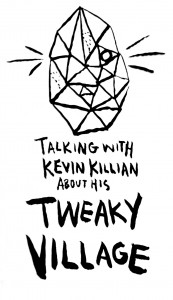
Kevin Killian is a prolific novelist, poet, playwright, photographer, and Amazon-reviewer known as one of the original New Narrative writers. He’s also the author of the new poetry collection TWEAKY VILLAGE from WONDER, 2014. It’s a wild and ranging collection of poems/narratives that deal with the author’s response to free-market capitalism, the constraints of the English language, the repetitious nature of porn, and much more.
I first met Kevin whilst TAing for Dodie Bellamy’s infamous “Writing on the Body” class at San Francisco State University. Kevin Killian taught (and still does) at California College of the Arts. One day Dodie was absent and her partner, Kevin, arrived as the substitute teacher. (What a pleasant surprise!) We performed one of his plays featuring Kylie Minogue and a host of 90’s celebs, unpacked some abject bodily poems, and left with our minds forever altered. I remember Kevin engaging a student who had very conservative/fundamentalist views about sex and drugs. Kevin kindly and patiently explained that sometimes you need those kind of experiences to figure out what kind of life you want to have. Here Kevin discusses making up for lost time, neoliberalism, genre collapse, loving Arthur Russell, San Francisco’s shifting economic landscape, Santa Claus as Bill Clinton, his photo project “Tagged,” and on and on and onward.
***
Matt L. Rohrer: Hi Kevin! Thanks for doing this interview! I LOVE TWEAKY VILLAGE Could you tell a bit of the story behind this book? What was going on in San Francisco, in your life, in the world that spawned these poems?
Kevin Killian: Thank you Matt. I suppose it is a book of defeat really. Just as while writing ARGENTO SERIES I came to realize how little I had done to stop the march of AIDS, TWEAKY VILLAGE is me wrestling with how little I did to combat neoliberalism, which manifests itself visually every time I walk out my door and see the new, hyperwired global capital that is San Francisco today. Another thing that happened is that I began teaching and thus mixing with younger people and the contradictions of their beauty (or youth, which is the same thing), and the shrinking possibilities our world, our country holds out to them makes me feel implicated in the very system I detest.
Fabled Lives: A review of Drops on the Water by Eric G. Müller and Matthew Zanoni Müller
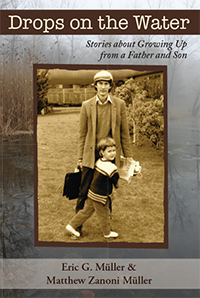 Drops on the Water
Drops on the Water
by Eric G. Müller and Matthew Zanoni Müller
Apprentice House, 2014
274 pages / $16.95 Buy from Apprentice House or Amazon
Vladimir Nabokov once said “…literature was born on the day a boy came crying wolf, wolf and there was no wolf behind him…Between the wolf in the tall grass and the wolf in the tall story there is a shimmering go-between. That go-between, that prism, is the art of literature.”
In their debut memoir, Drops on the Water (Apprentice House 2014), co-authors Eric G. Müller and Matthew Zanoni Müller conjure those dark, shimmering tales of childhood.
A collection billed as “stories about growing up from a father and son,” the book’s structure appears deceptively simple: a chronological staging of moments from each of these writers’ young lives. This, however, is where any pretense of simplicity ends. Not only do father and son appear as children in their own tales, they materialize in each other’s stories as shadowy influences hovering in the background, or at times, stepping forward and playing the roles of antagonist, shape-shifter, babe in the woods, savior. It is as though they have positioned themselves in a funhouse hall of mirrors, so that we get to see multiple sides of them, even as they––as narrators––attempt to contain our attention to the story at hand. This strategy allows the Müllers to take full advantage of the inherently unreliable nature of their first-person narratives and help the reader recognize the wolfish, the prismatic, aspects of their tales.
Eric Müller, the father, begins his story in rural Switzerland, where he rides crimson gondolas and tramps through wintry forests, before moving to South Africa where he encounters a phantom horse that forces him to consider his own mortality, hunts pheasants in Zululand, and befriends a thuggish young classmate whose mother feeds him a rich, oily soup that turns out to be swimming with chicken hearts. Yet despite the sly, fairytale quality of Müller’s prose, a ribbon of grim realism persists throughout. In one of the book’s most unsettling stories, he watches as two schoolmates torture squirrel-like dassies on the savannah by stabbing them and yanking the slick ropes of their intestines out and gleefully waving them in the air. Afraid of being shamed by his peers, the child pretends he isn’t troubled by this brutality, which we recognize as his own version of crying wolf. Even so, the wolf sinks its teeth in our narrator’s hide. “Two more suffered the same fate before we returned to the farmhouse. I felt guilty and sickened by the hunt…one thing I knew for sure, it would be a long time before wars would be eradicated on this earth.”
August 8th, 2014 / 10:00 am
“Cunny Poem Vol. 1” by Bunny Rogers
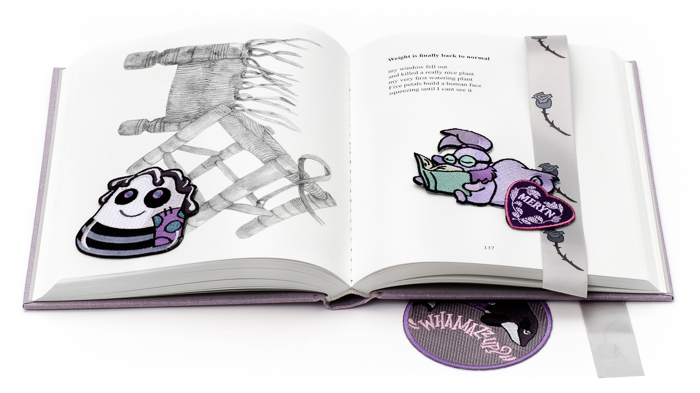
All men are cops
cuff me Im guilty
cuff me Im guilty
cuff me Im guilty
Cunny Poem Vol. 1 is an archive, a complete archive, of Bunny Rogers’ poems posted on her tumblr Cunny Poem. As an artist, Rogers’ work focuses on the multiplicity of meaning inherent in objects such as ribbon, blankets, flowers (see her interview with Harry Burke in the latest issue of Mousse Magazine). This sentiment can be felt as well in her newest project. We can look at the book as an object. It is comprehensive. The rose ribbon, speaks to the cover, speaks to the badges, speaks to the dried flowers, speaks to the words inside. Brigid Mason’s illustrations are as haunting as they are beautiful, a horse minus a hoof, a riveting world of eyes and postures. The book becomes multi-dimensional in an extraordinary way, leading us to question what the book can become.
August 7th, 2014 / 3:00 pm
25 Points: New Tab
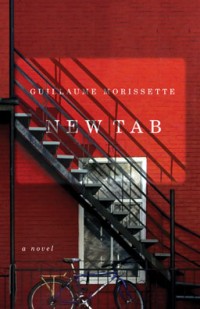 |
New Tab
by Guillaume Morissette
Véhicule Press, 2014
224 pages / $19.95 buy from Véhicule Press or Amazon
|
1. Video games don’t offer happiness—or exciting work environments.
2. This novel reminded me how bad I am at French. (My dreams of conversing with Guillaume in a foreign language are crushed.)
3. My generation is both really poor and unhappy—even with college degrees and semi-supportive parents. (On the bright side: we like to party a lot.)
4. Don’t know why Ines and company allowed Dan to live with them. Even if he did offer to pay cash up front, why would you want to live with a creepy forty-something?
5. This novel furthered the American stereotype that Canadians drink a lot of beer.
6. Brent’s an asshole—I don’t like him. (Whomever “Brent” was based off of, if you’re reading this, I hope we’re given an opportunity to meet and reconcile so my current opinion of you can change to a more positive one.)
7. When I first started this novel, the writing style kind of reminded me of Taipei by Tao Lin—but I got over that quickly because Morissette’s characters were actually interesting.
8. To reiterate: I liked this novel way more than Taipei.
9. To whomever “Cristian” is based off of: let’s build an ice rink together.
10. This novel really made me want to move to Montreal. Apparently that’s where the party’s at.
August 7th, 2014 / 12:00 pm
Valerie and Her Week of Wonders (reviewing films released some time ago)
Swallowing pearls, drinking chicken’s blood, fighting off creepy clergymen: these are among the many bizarre challenges our protagonist must endure in Valerie and Her Week of Wonders (Dir. Jaromil Jireš, 1970). Valerie, played by the beautiful Jaroslava Schallerova, is a 13 year old girl living with her grandmother in a small town where religion is paramount and old-time ideals are treasured. She spends her days practicing piano, attending church services, and having tea with her grandmother: all things seemingly ordinary for an obedient child. But beneath the pretty surface there is something rotten about this rustic Czechoslovakian hamlet. Vampires! Lecherous priests! Debauching actors in animal masks! And witch-hunting townspeople!
25 Points: Sorrowtoothpaste Mirrorcream
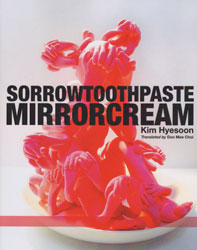 |
Sorrowtoothpaste Mirrorcream
by Kim Hyesoon, translated by Don Mee Choi
Action Books, 2014
106 pages / $12.00 buy from Action Books or Amazon
|
1. I requested a review copy of this book because I loved Don Mee Choi’s previous translation of Kim Hyesoon’s All the Garbage of the World Unite.
2. I loved it so much that I would read one of her poems at my own poetry readings (not as my own of course, but yeah I wish I’d written them).
3. Secretly, I want to brush my teeth with sorrowtoothpaste. Doesn’t seem like it’d be overly minty. And if I used mirrorcream, I’d wonder if I’d see myself as others see me.
4. The first great phrase in this book is “clammed up like a cavity-ridden piano.” We are introduced to to characters, Melan and Choly. They are my friends too.
5. I feel these poems the way I feel seaweed in my teeth: uncomfortable but familiar.
6. The poem, “Glasses Say” might be some re-imagining of Adrienne Rich’s “Diving into the wreck.” I said might:
“…A vacant place. Only fan shells, a hook, an oxygen tube, a pair of goggles.
And a lady behind the goggles.
I shave a large piece of ice to make lenses.
I put the lenses in my mouth.
It’s raining in the sea.”
7. Umbrellas, ocean, water, ice. Nipples, milk, clouds, spit.
8. As I read, I’m not sure if what I’m seeing is what I’m really seeing, or if what I’m feeling is really feeling what I’m feeling. The sadness doesn’t overwhelm me. It sits in my chest like an orb, just sort of just glowing. I remember what this feels like. I have been this sad. I don’t think my sad was this beautiful.
9. “…I’m filled with all the screams of the world / that there is nothing else but that…”
August 5th, 2014 / 12:08 pm
Worst New Poets ???????
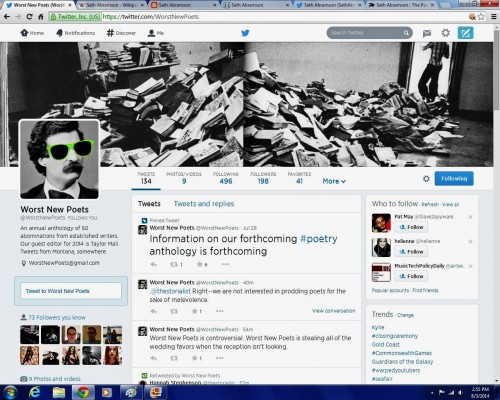
*******
There’s nothing new about anonymous Twitter accounts taking shots at well-known writers. Some of them are funny. Some of them are mean. Some of them are neither. Some of them are both.
But what’s got my attention about Worst New Poets is that they’re engaging with their Followers (internet heavyweights like Elisa Gabbert and Rebecca Hazelton– but enough celebrity name dropping here) in a generally reasonable and intelligent manner. Plus, of course, how can you not show some interest in someone shoving pies in people’s faces?? (But, I wonder, is this something we need?? … I dunno… And what’s the deal?? … I mean, what’s the deal ?? ..)
So, anyways I reached out to Worst New Poets, they responded promptly and politely, and here, now, is the transcript of a quick little Q & A that we did:
*******
Rauan: Please tell me what Worst New Poets is all about ?? (ie: what is it? why are you doing what you’re doing? what good (if any) do you expect to come of it ??)
Worst New Poets: Worst New Poets was originally a spur-of-the-moment response to the annual release of Best New Poets (whom we admire very much). The impulse to start WNP, however, was not unfounded. These thoughts about the poetry landscape have been gestating in our heads—subconsciously maybe—for quite some time. We thought it was an interesting idea to call out some flaws published by established writers, instead of praising 50 “new” poets that were breaking ground in contemporary poetry. We don’t have a set goal in sight, though we do enjoy the discourse that has been generated in the past week, so we don’t think we’ll stop any time soon.
Like we mentioned during the initial barrage of Twitter attacks (exaggerating), we like the idea of creating discourse within a community that far too often promotes from within. There seems to be a clear consensus among writers that the current literary landscape is extremely incestuous, READ MORE >
Juliet Escoria & Scott McClanahan’s Honeymoon Tour Diary (Part 3)
Read the entire Juliet & Scott honeymoon saga here.
FRIDAY, JULY 11 2014 (CONTINUED)
CHICAGO
JULIET: We got to Kelly & Jacob Knabb’s around 5pm. They have a really cute baby. They also have two really cute dogs but the dogs barked and the baby didn’t so I think I like the baby more. Kelly and Jacob were both reading with us that night.
We were running very late. (Kelly & Jacob live about an hour outside of Chicago and there was a lot of traffic.) It was making me nervous. I tried to not care about running super late and it was hard. I kept on telling myself that readings never start on time and no one would care if we were late. I didn’t entirely believe myself.
When we were a block away from the reading, Scott pointed out the window and said, “Is that Sam?” I looked where he was pointing. It was Sam Pink. He was walking in the opposite direction of the reading. I rolled down the window and yelled “Hello” in an unintentionally funny voice. We kept on driving.
Rachel Pattycake Bell met us outside, along with Nathan Masserang, Brooks Sterritt, Austin Islam and some other people who I am possibly friends with on Facebook. Rachel gave us Hello Kitty marshmallows and a chocolate phone as a wedding present. No one cared that we were late. We made some jokes about not being able to make phone calls because your phone had melted because it was made out of chocolate. Scott took off his shirt and changed into a new one outside the building because the one he was wearing had gotten sweaty during the drive. I tried to block him so people didn’t see his fat stomach or his weird tan. I thought it was strange that he wasn’t ashamed to change his shirt in the middle of the street in front of a bunch of people, but he’s a lot less fat now than he used to be so maybe he was excited to show off his hot bod.
August 4th, 2014 / 2:00 pm
A Lower Deep: On Snowtown
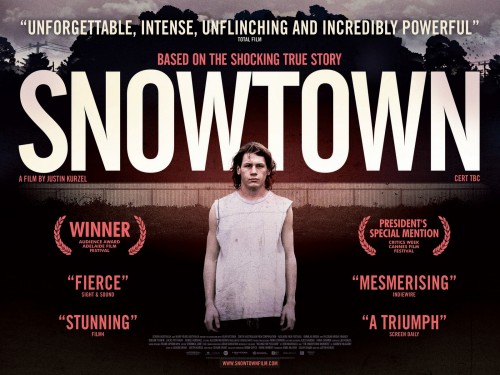
Trigger warning: this post discusses sexual violence.
The following post contains spoilers.
***
Snowtown. That is the proper title of the film. It is infinitely better than The Snowtown Murders, the title the film was given for its American release. The Snowtown Murders is obvious and boring. Snowtown is mysterious and foreboding; it implies that what happened in Snowtown is unspeakable.
It is a haunting film. It is not so much about the murders themselves, or the man who masterminded them, as it is about an innocent boy’s descent into hell.
Lucas Pittaway stars as the boy in question, the 16 year-old Jamie. An unnerving early scene makes it clear that he, along with his brothers, are being sexually abused by their mother’s boyfriend. In another (even more disturbing) scene, Jamie’s older brother Troy bullies him, wrestles him to the ground, and anally rapes him. Pittaway’s performance is striking in its understatement: he seems resigned to his miserable lot in life; drawn deep into himself, he is there, but he’s not. Observe Pittaway in the poster above: the expressionless face, the blank stare, the body language that suggests that he is trying to disappear into his surroundings. It is a chilling portrait of the nature of trauma, a surface of numbness beneath which lies an abyss of pain.
Eventually a man named John Bunting comes into his life as his mother’s new boyfriend. John seems to be the first person in Jamie’s life to stand up for him; John harasses the mother’s abusive ex-boyfriend, who happens to live across the street (a perpetual reminder of Jamie’s trauma) until the man moves. A scene in which John crushes severed kangaroo body parts (which he eventually throws at the ex-boyfriend’s house) is perhaps the first sign that something ugly lurks beneath the man’s friendly demeanor. Later on he invites Jamie over for dinner; in the middle of the meal, he turns to Jamie and says simply, “Do you like being fucked?” He then forces Jamie to shoot his (John’s) dog. This is the beginning of John’s total domination of Jamie, who he enlists as an accomplice in a series of murders. John tells Jamie that he is going to show the boy how to stick up for himself but what he actually does is destroy what remains of Jamie’s soul.
The obvious question is why Jamie goes along with John’s brutal actions. In one scene, Jamie sits silently in one room while in another John and his accomplice Robert viciously torture Jamie’s brother Troy. At this point, among others, Jamie could conceivably attempt to alert neighbors and/or notify the police and yet he does not. The abuse he has already suffered seems to have permanently broken his spirit; he is unable to act on his own accord when faced with the transgressions of his latest abuser. John thus enlists Jamie because, despite his rhetoric, on some level he sees the boy as the perfect accomplice, an individual over whom he can exert total control.
August 4th, 2014 / 10:00 am
Calabasas
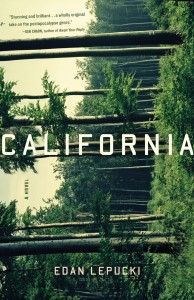 California
California
by Eden Lepucki
Little, Brown and Company, July 2014
400 pages / $26 Buy from Amazon
Even before picking up Eden Lepucki’s 2014 post-apocalyptic-near-future novel California, I’ve been enthusiastic about the city of Calabasas, or as Nick would say, “obsessed with.” Calabasas is at the edge of Los Angeles, where Mulholland Drive ends its twenty-one mile tour through Hollywood’s dark heart. Located in a southwest curve of the San Fernando Valley, it is just on the other side of the Santa Monica Mountains from Malibu, but it’s as far from a beach paradise as the moon. When I ask my mom what she knows about Calabasas she looks at me and asks, “Isn’t that where all the porn is?” Who wouldn’t be obsessed?
Nick and I relocated to Los Angeles last summer. Since then I’ve been preoccupied with William Mulholland and his vision for the city: bringing water and commerce to the desert. Putting a whole bunch of people where really, they don’t belong. Werner Herzog, Joan Didion, Mike Davis and countless others have tried to capture the sense of LA being the end: the end of the road, the end of history, the end of the world, without denying it’s also a bit of paradise: full of promise, a beginning, the future. It’s a place where millions of people go to work every day. Moby claims to have moved to LA explicitly for its “pre-apocalyptic strangeness” and because it was “always seemingly an inch away from some sort of benign collapse.” At the city’s fringes, that benign collapse is already underway.
On the face of it, Calabasas synthesizes many of the repelling and alluring adjectives attributed to LA: success, consumption, celebrity ‘culture’ (desirable, self-absorbed, etc.), wealth, exclusivity, naïveté, and so on. It similarly has aspects of the “near future,” “pre-apocalypse strangeness,” “dystopian,” “wasteland,” often ascribed to the city of angels. In the never-ending quest to articulate this captivating paradox: Calabasas represents a microcosmic example to study and to look for answers.
In California Lepucki’s anonymizes and generalizes the state’s geographical space and social concepts into pronouns like “The Land,” and communities such as “The Community,” or “Walmart.” However, she decided not to change the name of one Los Angeles community: Calabasas. The LA Times critic Karolina Waclawiak says of the novel, “In this deeply stratified ‘afterlife,’ the wealthy still hoard what little resources are left (intermittent electricity, expensive Internet, packaged food) and shelter themselves away in Communities with names like ‘Calabasas’ and the nearby ‘Pines.’” I don’t think this is a coincidence. If you’re searching for a particular brand of ill-omened California to inspire a portentous novel, Calabasas is a wise choice.
August 4th, 2014 / 10:00 am
